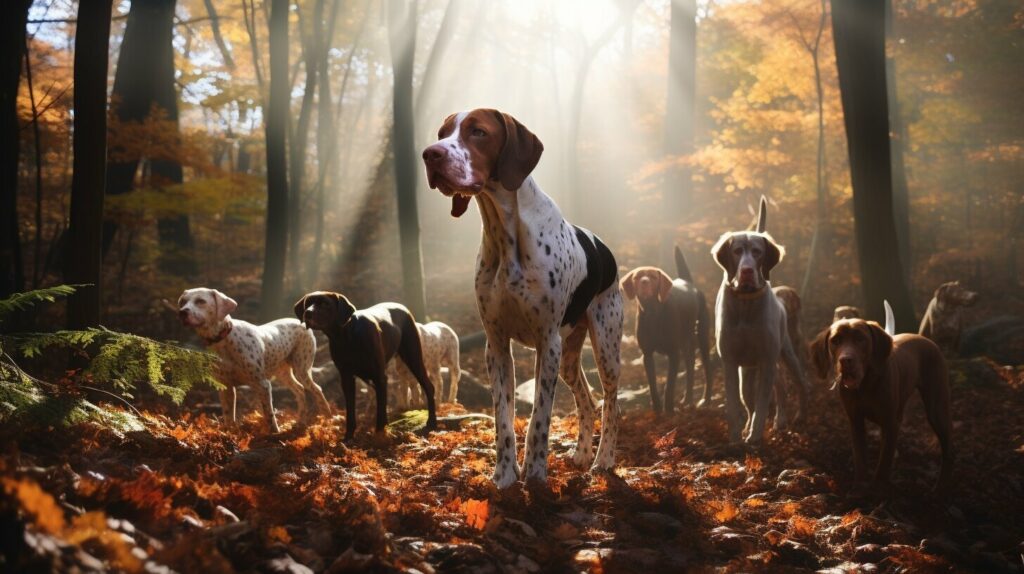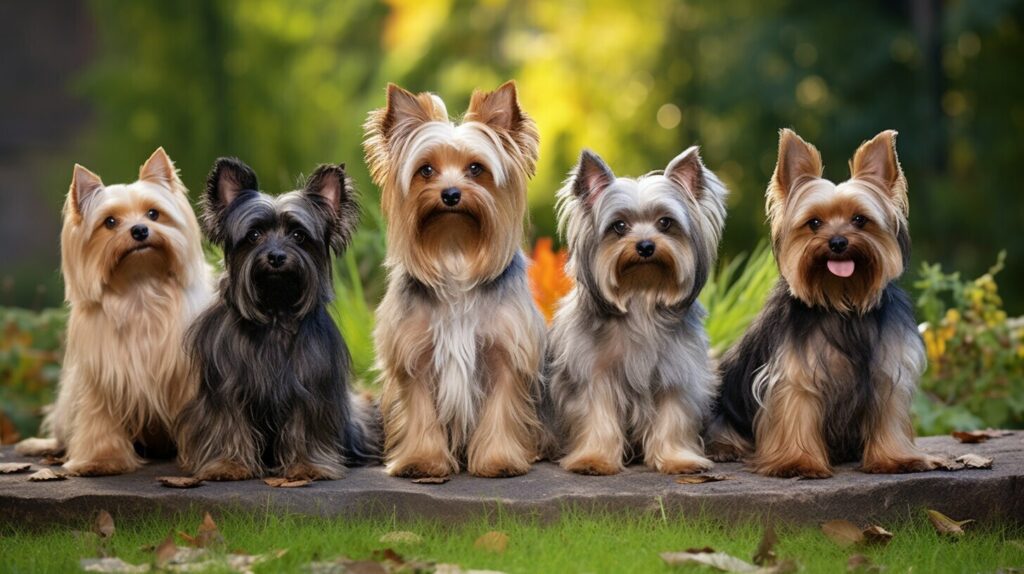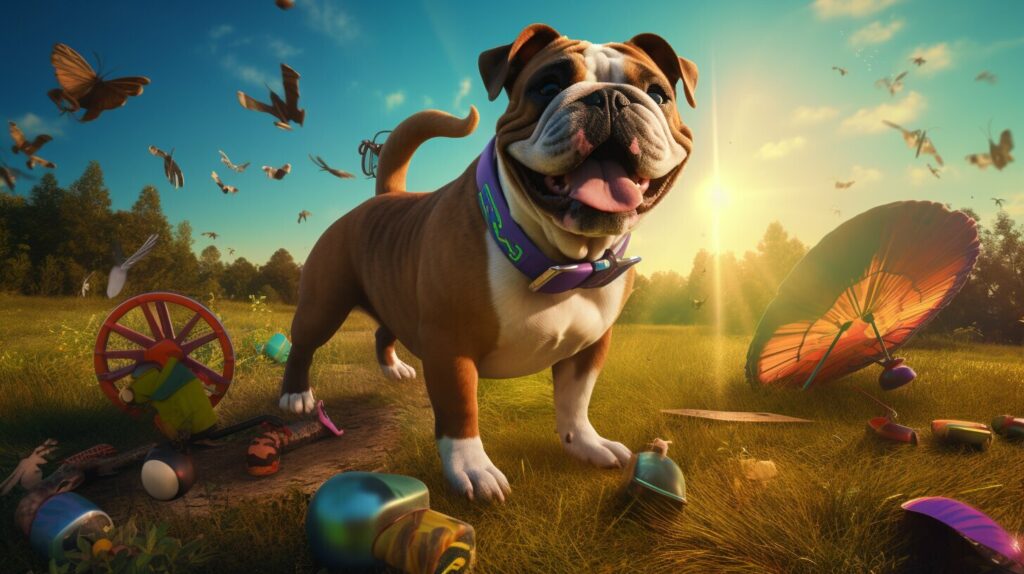Are you an avid hunter looking to enhance your game retrieval capabilities? Have you considered utilizing pointer dogs as your ultimate hunting companion? These versatile gun dogs possess a unique set of skills that make them perfect for the hunting world.
Pointer dogs have been used for centuries to help hunters track, point, and retrieve game. These intelligent and athletic dogs are known for their keen sense of smell and remarkable instinctive abilities. Whether you’re hunting upland birds or small game, pointer dogs can help you improve your hunting success rate, making them a valuable asset to any hunting group.
Key Takeaways:
- Pointer dogs are a type of hunting dog known for their ability to track, point, and retrieve game.
- They are versatile gun dogs that possess a unique set of skills that make them perfect for the hunting world.
- Pointer dogs are intelligent, athletic, and have a keen sense of smell and remarkable instinctive abilities.
The Different Breeds of Pointer Dogs
If you are interested in owning a hunting dog, pointer dogs are a great choice. These versatile gun dogs are bred specifically to assist hunters in locating and retrieving game, and they come in two main breeds: the German Shorthaired Pointer and the English Pointer.
The German Shorthaired Pointer is a medium-sized dog breed that originated in Germany in the 19th century. They are known for their high energy and athleticism, making them great running or hiking partners. Their short, dense coat comes in various colors, including liver and white, black and white, and solid liver. German Shorthaired Pointers are especially well-suited for upland game hunting, waterfowl hunting, and even tracking.
The English Pointer, on the other hand, is a tall, muscular dog breed that originated in England several centuries ago. They are known for their graceful appearance and keen sense of smell. English Pointers have a short, smooth coat that comes in a variety of colors, including lemon, liver, black, and orange. They are particularly well-suited for hunting quail, pheasants, and other small game birds.
| Breed | Origin | Size | Coat | Colors | Suitable For |
|---|---|---|---|---|---|
| German Shorthaired Pointer | Germany | Medium | Short, dense | Liver and white, black and white, solid liver | Upland game hunting, waterfowl hunting, tracking |
| English Pointer | England | Tall | Short, smooth | Lemon, liver, black, orange | Hunting quail, pheasants, small game birds |
Both breeds of pointer dogs are intelligent, loyal, and trainable, making them great companions for hunters and outdoor enthusiasts alike. When considering which breed to choose, it’s important to research each breed’s specific characteristics, origins, and suitability for hunting purposes.
Training Pointer Dogs for Hunting
Training pointer dogs for hunting is an essential part of owning these versatile gun dogs. When properly trained, pointer dogs can become valuable hunting partners, helping you to track, flush out, and retrieve game. To ensure success in the field, it is important to follow a comprehensive training program that includes obedience training, scent training, and field training.
Obedience Training
Basic obedience training is essential for all dogs, including pointer dogs. Teaching your dog basic commands such as sit, stay, come, and heel will help establish a solid foundation for more advanced training. Positive reinforcement techniques, such as using treats and praise, can help to reinforce good behavior and encourage your dog to respond to commands.
Scent Training
Pointer dogs are known for their exceptional ability to locate and point game, and scent training is an important aspect of their training program. This involves introducing your dog to different scents, such as those of game birds, and teaching them to follow those scents to locate game. Scent training can be a complex process, and it is important to seek guidance from a professional trainer if you are unsure how to proceed.
Field Training
Field training is an essential part of training pointer dogs for hunting. This involves introducing your dog to hunting scenarios, such as tracking, pointing, and retrieving game. During field training, you will teach your dog to work with you as a team, using hand signals and voice commands to communicate and direct their movements. Gradually increasing the difficulty of the scenarios will help to build your dog’s skills and confidence in the field.
Training pointer dogs takes time, patience, and consistency. It is important to start training your dog as early as possible, ideally when they are still puppies, to establish good habits and behaviors. Seek professional guidance if you are unsure how to proceed, as working with a professional trainer can help to ensure the success of your training program.
Utilizing Pointer Dogs in the Field
When it comes to hunting dogs, pointer dogs are some of the most versatile and effective companions you can have by your side. With their remarkable scenting abilities and natural instincts, pointer dogs are excellent at tracking, pointing, and retrieving game in the field.
Roles in Hunting
One of the main roles of pointer dogs in hunting is tracking game. These dogs are trained to follow the scent of the game and lead their owners to the location. They also have the ability to point, which means they freeze in place when they locate the game. This can be extremely useful for hunters, especially when the game is elusive or hiding.
Another key role of pointer dogs is retrieving game. After the shot has been fired, these dogs can be trained to find and retrieve the game. This can save hunters time and effort, and it can also help ensure that all hunted animals are recovered and used.
Covering Large Areas
One of the unique advantages of pointer dogs in hunting is their ability to cover large areas of land efficiently. Their high energy and endurance means they can run for long distances without getting tired, making them ideal for hunting in challenging terrain.
In addition, many pointer dogs have a natural instinct to know when to hold back and when to push forward. This allows them to work closely with their owners and adjust to the specific hunting conditions and needs.
Overall, pointer dogs are an invaluable asset to any hunter who wants to take their hunting game to the next level. With their unique abilities and natural instincts, these dogs can help you track, point, retrieve, and ultimately bring home your game.
Caring for Your Pointer Dog
Pointer dogs make excellent hunting companions, but they also require proper care to maintain their health and happiness. Here are some tips to ensure your pointer dog receives the care they need:
Exercise Needs
Pointer dogs are active and energetic, so they require regular exercise to stay healthy and happy. Aim for at least 30 minutes of exercise per day, such as walks, runs, or playing fetch. However, be cautious not to over-exercise them during hot weather or in unfamiliar environments to avoid injury or exhaustion.
Grooming Requirements
Pointer dogs have short, dense coats that require minimal grooming. Brush their coat once or twice a week to remove loose hair and keep their coat shiny. Bathe them only when necessary to avoid stripping their coat of natural oils. Trim their nails regularly and clean their ears to prevent infections.
Nutritional Considerations
Feed your pointer dog a balanced diet that meets their nutritional needs. High-quality dog food with protein as the main ingredient is ideal. Avoid overfeeding them as pointer dogs tend to gain weight easily, leading to obesity and other health problems. Consult with your veterinarian to determine the appropriate serving sizes and feeding schedule for your dog.
Regular Check-ups
It’s essential to schedule regular check-ups with your veterinarian to keep your pointer dog healthy. Bring them in for a comprehensive exam and vaccinations at least once a year. Take note of any changes in their behavior or appetite and contact your veterinarian if you have any concerns.
Vaccinations and Parasite Control
Make sure your pointer dog is up-to-date with all their vaccinations to protect them from common diseases. Additionally, use parasite control measures to prevent fleas, ticks, and heartworms. Your veterinarian can recommend the best products for your dog based on their age, size, and lifestyle.
By following these tips, you can keep your pointer dog healthy and happy, ensuring they are fit for hunting and ready for adventure.
Ensuring the Health and Well-being of Pointer Dogs
Pointer dogs are generally healthy and hardy breeds, but like all dogs, they can be prone to certain health issues. To keep your pointer dog in optimal health, consider the following tips:
Regular Veterinary Check-ups
It is important to schedule regular check-ups with your veterinarian to ensure your pointer dog remains healthy and to catch any potential health issues early on. Your veterinarian will provide routine vaccinations, perform regular physical exams, and test for common parasitic infections.
Proper Nutrition
Feed your pointer dog a high-quality dog food that is appropriate for their age, activity level, and overall health. Be sure to also feed them appropriate portions and avoid overfeeding, which can lead to obesity and other health issues. Consult with your veterinarian for specific dietary recommendations.
Regular Exercise
Pointer dogs are active breeds and require daily exercise to maintain their physical and mental health. Regular exercise can prevent obesity, promote good cardiovascular health, and help keep your dog mentally stimulated and happy. Aim for at least 60 minutes of exercise a day, which can include walks, runs, or playing fetch.
Parasite Control
Parasites such as fleas, ticks, and intestinal worms can cause health problems for your pointer dog. Regular parasite control, through the use of topical medications, collars, or oral medications, is important for preventing infestations and keeping your dog healthy.
Weight Management
Obesity can lead to serious health issues in pointer dogs, such as diabetes, heart disease, and joint problems. Monitor your dog’s weight and body condition regularly, and adjust their diet and exercise routine accordingly.
Preventative Health Care
Work with your veterinarian to establish a regular preventative health care routine for your pointer dog, which can include vaccinations, dental care, and regular check-ups. This will help keep your dog healthy and prevent potential health issues from occurring in the first place.
Finding and Selecting Pointer Puppies
When looking for a pointer puppy, it’s important to do your research and find a reputable breeder. Ask for references and check online reviews to ensure the breeder has a good reputation.
When evaluating puppies, pay attention to their health and temperament. Look for puppies that are active, inquisitive, and have a friendly disposition. Avoid puppies that are lethargic, show signs of aggression, or have any physical abnormalities.
Consider the puppy’s future potential as a hunting dog. Look for puppies that come from a line of successful hunting dogs and exhibit natural pointing instincts. Ask the breeder about the puppy’s parents and any previous litters.
Remember, selecting a pointer puppy is an investment in your future hunting partner. Take the time to make an informed decision and choose a puppy that is a good fit for you and your lifestyle.
Tips for Training Pointer Puppies
Training your pointer puppy is crucial to their development as a hunting dog. Here are some tips to help you train your pointer pup:
- Socialization: Socializing your puppy with other dogs, people, and new environments is essential for a well-rounded hunting dog. Start socializing your puppy as early as possible.
- Obedience Training: Basic obedience training is fundamental to any dog’s training. Start with teaching your puppy simple commands like sit, stay, and come. These commands will come in handy while teaching your pup more advanced commands.
- Introduction to Hunting: Introduce your puppy to hunting scenarios gradually. Start by introducing them to birds and teaching them to fetch. Gradually progress to more complex hunting scenarios.
- Positive Reinforcement: Use positive reinforcement techniques, such as treats and praise, to encourage good behavior in your pup. Positive reinforcement is proven to be more effective than punishment-based training.
- Patience and Consistency: Training a pointer puppy requires patience and consistency. Set a regular training routine and stick to it. Understand that your puppy may make mistakes, but patience and consistency in training will pay off in the end.
Remember, training your pointer puppy is an ongoing process that requires dedication and patience. With proper training, your pointer pup can become a skilled and reliable hunting dog.
Conclusion
Pointer dogs are remarkable hunting dogs with unique abilities that make them invaluable in the field. Their versatility, speed, and endurance make them ideal for tracking, pointing, and retrieving game. By utilizing these dogs in your hunting pursuits, you unlock their full potential and enhance your overall experience.
If you’re considering adding a pointer dog to your hunting team, it’s important to research reputable breeders and select a puppy with good health and temperament. Proper training, including obedience and scent training, is crucial to developing their hunting skills. Additionally, caring for your pointer dog through regular exercise, grooming, and veterinary check-ups is key to ensuring their health and well-being.
Overall, pointer dogs are an excellent addition to any hunting team and can greatly enhance your outdoor pursuits. By investing time and effort into your pointer dog’s training and care, you’ll have a loyal companion and skilled hunter by your side for years to come.
FAQ
Q: What are pointer dogs?
A: Pointer dogs are a type of hunting dog known for their unique abilities in tracking, pointing, and retrieving game. They are highly skilled and versatile gun dogs.
Q: What are the main breeds of pointer dogs?
A: The main breeds of pointer dogs are the German Shorthaired Pointer and the English Pointer. These breeds have distinct characteristics and origins, but both are suitable for hunting purposes.
Q: How do you train pointer dogs for hunting?
A: Training pointer dogs for hunting involves obedience training, scent training, and field training. It is important to develop their hunting skills through proper training techniques.
Q: How are pointer dogs utilized in the field?
A: Pointer dogs are used in hunting for tracking, pointing, and retrieving game. They have the ability to cover large areas of land efficiently, making them valuable assets in the field.
Q: How should I care for my pointer dog?
A: Proper care for a pointer dog includes meeting their exercise needs, grooming requirements, and providing them with a balanced diet. Regular check-ups and vaccinations are also essential for their overall health and well-being.
Q: What are common health issues for pointer dogs?
A: Pointer dogs may face common health issues such as hip dysplasia, allergies, and eye problems. Regular vaccinations, parasite control, and monitoring their weight are important for their health.
Q: How do I find and select a pointer puppy?
A: When finding and selecting a pointer puppy, it is important to research reputable breeders, evaluate the health and temperament of the puppies, and consider their future hunting potential.
Q: What tips do you have for training pointer puppies?
A: Training pointer puppies requires socialization, basic obedience training, and gradually introducing them to hunting scenarios. Patience and consistency are key in training young pointer dogs.



